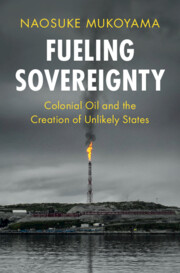‘A fascinating story of origins, first unearthing and then resolving a puzzle that scholars of international politics have overlooked in the transition away from empire: how were many hundreds of colonies transformed into a much smaller number of post-colonial states? Who got sovereignty, who didn’t, and why? This beautifully written treatment ranges across regions in weaving together an explanation combining the ideas, geopolitics, and resource endowments.’
J. C. Sharman - University of Cambridge
‘Fueling Sovereignty is an outstanding scholarly achievement, offering intriguing new insights into the intersection between resource politics, sovereignty, and evolution of the modern international system. Naosuke Mukoyama compellingly explores how the timing and scope of oil discoveries crucially conditioned local leaders’ abilities to resist imperial pressures for amalgamation, often yielding powerful new petro-states in defiance of Western designs. This is a tremendous book, which will be of interest not only to historical International Relations scholars, but to everyone curious to better grasp how struggles for control over natural resources continue to profoundly influence world politics.’
Andrew Phillips - Associate Professor of International Relations and Strategy, School of Political Science and International Studies, University of Queensland
‘Naosuke Mukoyama’s innovative study blends theories of state formation and natural resource politics to craft a fascinating account of how colonial oil production facilitated the creation of the world’s most unlikely sovereign states. Through close readings of deviant cases, Fueling Sovereignty illuminates broader relationships between resources and political development, while reminding us of the historical contingency and complexity of decolonization.’
Emily Meierding - Naval Postgraduate School and author of The Oil Wars Myth
‘When the wave of decolonization occurred in the last century, borders could have been and were drawn in many different ways, and prior colonial boundaries did not always translate into lines on a map demarcating sovereign states. Against this historical background, how is it that certain seemingly improbable, small states emerged out of these processes? In this pathbreaking study, Naosuke Mukoyama convincingly elucidates the factors and logics that allowed a number of otherwise ‘unlikely states’ to come into being.’
T. H. Hall - Professor of International Relations, University of Oxford
‘This book will be of interest to a broad audience of scholars in International Relations, politics and history.’
Johanne Marie Skov
Source: International Affairs



